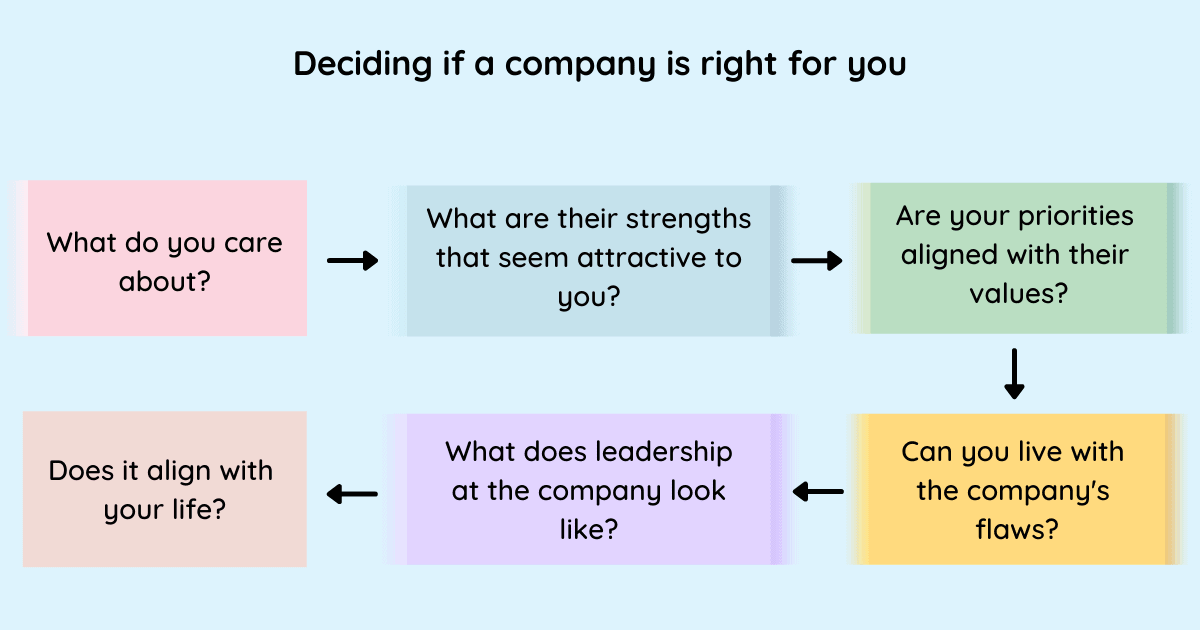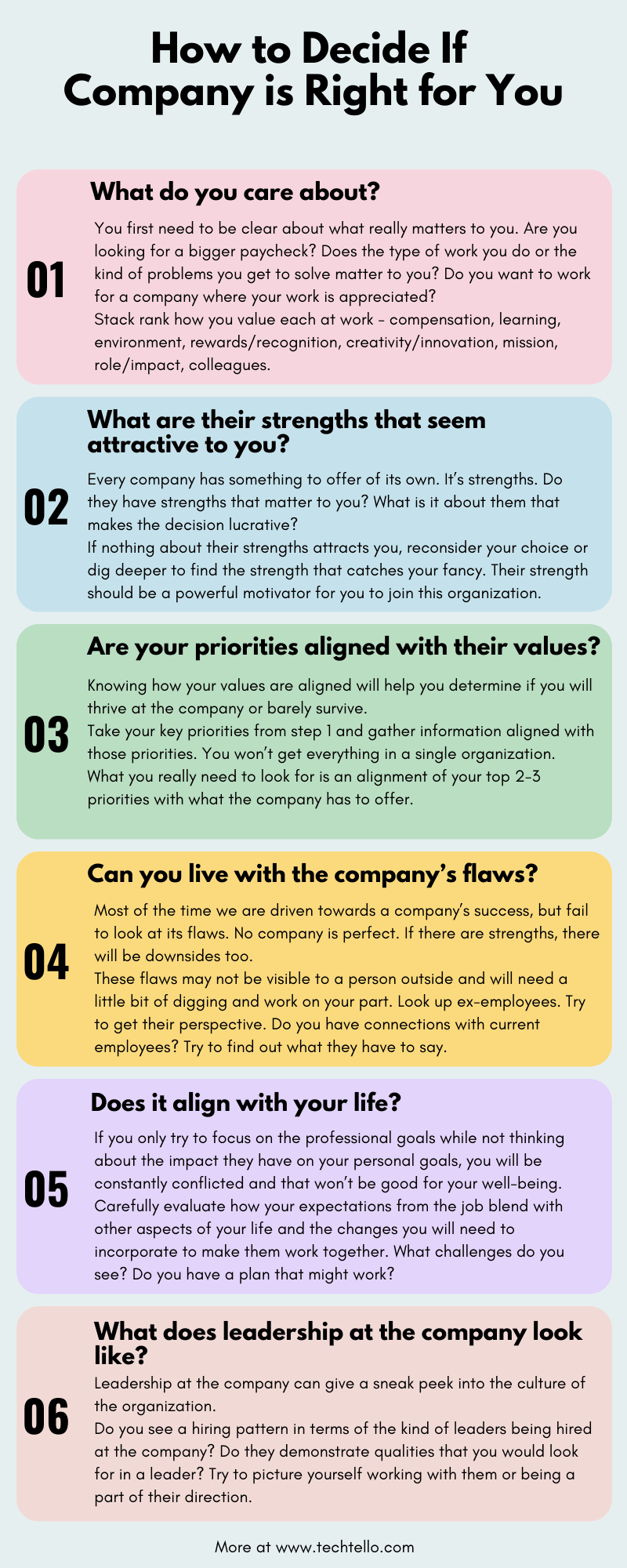How to Decide If a Company Is Right for You

We spend a large part of our life at work, and yet when it comes to making a decision “Is this the right company for me,” most of us rely only on our expert intuition without any solid data to back it up.
Daniel Kahneman, a psychologist and economist notable for his work on the psychology of judgement and decision-making, says that our gut instinct alone can fail us when we make quick decisions based on our past experience as it’s a key source of noise. Instead he asks us to resist premature intuition “Intuition should not be banned, but it should be informed, disciplined and delayed.”
Data or intuition alone can’t help you make the right decision. You need both data and intuition to make an informed decision.
Think of it this way. When you meet a new person, how do you decide if it’s a relationship worth investing in or not? You probably look for signals that help you connect their identity to your identity. The relationship can’t get very far if the two are very far apart or if there’s something about the other person that does not match your value system. These signals provide valuable data points to form an opinion and you further rely on your intuition to guide you towards a specific decision.
When it comes to your job though, do you apply the same level of due diligence? Companies are after all in some sense similar to people. You can think of a company as a group of people with a shared identity. Spend effort into knowing this identity as you would with any new person. Determine if it’s a relationship worth investing.
No decision making framework can guarantee a successful outcome. You can never know for sure if you are making the right decision. Companies evolve. Leadership changes. Culture transforms. What was indeed a great choice a year back, may look like a terrible decision one year down the line.
Knowing that you used the right framework to decide can help you move forward instead of ruminating about it later when the outcome does not match your expectations. And how can you make this decision? By learning to ask the right questions. You can catch early signs that can prevent you from investing in a wrong relationship.
6 steps to determine if a company is right for you
1. What do you care about?
You first need to be clear about what really matters to you. This is really important. Because if you don’t know what you want, you can’t actively watch out for clues that can guide your decision-making.
The question you need to ask yourself is “Why do I want to work at this company?”
Are you looking for a bigger paycheck? Does the type of work you do or the kind of problems you get to solve matter to you? Do you want to work for a company where your work is appreciated?
Grab a pen and a paper and stack rank how you value each at work – compensation, learning, environment, rewards/recognition, creativity/innovation, mission, role/impact, colleagues. You can add more items to this list.
Don’t be vague about answering this question. Be crystal clear about your priorities. Take this advice from S.J. Scott in Declutter Your Mind, “When you first sit down to ponder your goals for the future, remember to have your core values and life priorities handy as points of reference. As long as your values and priorities remain valid, they should be the compass for directing your goals. Otherwise, you set yourself up for a future of frustration and unhappiness.”
To validate your thinking, invert your question and now ask yourself “What will make me miserable at this company if I don’t get it?” Something that will annoy you or bother you so much that you will consider leaving the organization. Inversion is a powerful mental model to explore the problem by thinking the opposite of what you seek. This form of reverse questioning can help you inquire your own assumptions, beliefs and in turn gain a better perspective to find answers to your original question with greater clarity and understanding. Repeat the stack ranking exercise above with this question in mind.
If your reasons for working at the company match the “what makes me miserable” list, you are all set to move on to the next step. If not, you need to reconsider your priorities.
2. What are their strengths that seem attractive to you?
Every company has something to offer of its own. It’s strengths. Do they have strengths that matter to you? What is it about them that makes the decision lucrative?
Do they attract the best talent? Are they the market leaders in their segment? Are they known for their cutting edge technology? Do they offer the best compensation and perks? Are they known for being an employee friendly workplace?
If nothing about their strengths attracts you, reconsider your choice or dig deeper to find the strength that catches your fancy. Their strength should be a powerful motivator for you to join this organization.
3. Are your priorities aligned with their values?
Knowing how your values are aligned will help you determine if you will thrive at the company or barely survive.
For example, if you value creativity and innovation, try to find out how the company empowers its employees. Do people feel safe to speak up and take risks? How are mistakes and failures handled?
If you value teamwork, find out how the company handles bad behavior. One bad apple at the company may not represent company values. However, presence of more than one such person could be a sign that the company tolerates or even incentivizes such behavior.
If you value learning and growth, find out if meeting deadlines is given more weightage than what people are learning on the job.
Take your key priorities from step 1 and gather information aligned with those priorities. You won’t get everything in a single organization. What you really need to look for is an alignment of your top 2-3 priorities with what the company has to offer.
4. Can you live with the company’s flaws?
Most of the time we are driven towards a company’s success, but fail to look at its flaws. No company is perfect. If there are strengths, there will be downsides too. If a company does a lot of things right, it will make mistakes too.
A company that’s great in strategic planning may suck at execution.
A company that’s known for great compensation may lead with a top-down culture.
These flaws may not be visible to a person outside and will need a little bit of digging and work on your part. Look up ex-employees. Try to get their perspective. Do you have connections with current employees? Try to find out what they have to say. Explicitly ask them about the flaws. You shouldn’t go with one feedback. But if multiple people point out the same thing, in all likelihood that’s how things are.
Now evaluate if this is something you can live with. Knowing this upfront not only helps you make the right decision, it will also help you be better prepared to deal with it later. Knowing it’s a conscious choice you made earlier will motivate you to move forward and apply constructive solutions to your problem instead of feeling frustrated by your situation and adopting destructive patterns of behavior later.
5. Does it align with your life?
We don’t pay enough attention to the changes to our life that our job may demand.
If you are required to travel three days a week, who will drop your kids to school on those days if you were the one taking care of it? What will happen to your plan to be home in time for dinner if your job requires you to attend meetings in the evenings? How will driving an extra hour each day fit with your goal to have a life which does not involve a stress filled commute? What happens to your plan to hit the gym in the morning when you need to have calls at the same time with the members of your team who are located all over the world.
If you only try to focus on the professional goals while not thinking about the impact they have on your personal goals, especially when you truly care about these personal goals, you will be constantly conflicted and that won’t be good for your personal well-being.
As Matthew Kelly writes in Off Balance “Work-life balance, work-life effectiveness, personal and professional satisfaction—or whatever you choose to call it—is not an entitlement or benefit. Your company cannot give it to you. You have to create it for yourself. You are personally responsible for living the best life you can.”
Carefully evaluate how your expectations from the job blend with other aspects of your life and the changes you will need to incorporate to make them work together. What challenges do you see? Do you have a plan that might work?
6. What does leadership at the company look like?
Leadership at the company can give a sneak peek into the culture of the organization. Do some research on people who occupy leadership positions at the company. Look them up on platforms like LinkedIn. Speak to the people in your network who might have worked with them in the past. Try to collect as much data as you can about their leadership styles.
Do you see a hiring pattern in terms of the kind of leaders being hired at the company? Do they demonstrate qualities that you would look for in a leader? Try to picture yourself working with them or being a part of their direction. Does it sound exciting or do you feel they don’t reflect your values?
After collecting these signals, ask yourself this final question – In which direction is data guiding me and what does my intuition say?
You can never be certain if you are making the right choice but by asking these questions, you can be prepared to make a better decision.
Summary
- Deciding to join an organization is a huge commitment that requires careful evaluation to make the right decision.
- Organizations are like people. Use both data and intuition to make the right decision just like you would do with any relationship.
- Start with defining your priorities. Identify what matters to you and what can make you miserable at the organization if you don’t get it.
- Learn about the company’s strengths. What about them attracts you?
- Try to align your top 2-3 priorities with what the company has to offer. No organization can give you everything. Make sure your top priorities are well aligned.
- Every company with its strengths has some flaws too. Dig to learn about these flaws and make sure you are willing to accept them.
- Evaluate how the expectations from the job align with your personal goals. You may need to make certain adjustments. Make sure you have a plan to make your work goals align with your personal goals.
- Understanding the kind of leadership that exists at the company can give you a sneak peek into the leadership at this organization. Make sure they demonstrate qualities you look for in a leader.
- Finally, combine all the data you have collected from the interview process and your network with your intuition to make a final decision. You will never know if it’s right, but you will be damn sure it will be a better one.

































